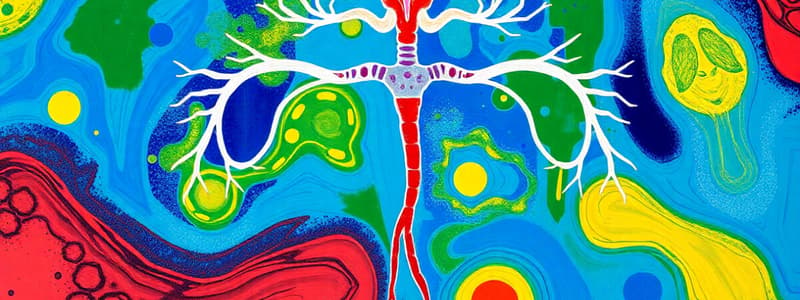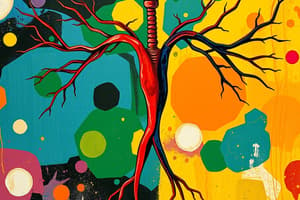Podcast
Questions and Answers
What is one of the primary roles of aldosterone in the body?
What is one of the primary roles of aldosterone in the body?
- Stimulate insulin secretion from the pancreas
- Increase calcium reabsorption in the kidneys
- Promote glucose uptake by cells
- Increase sodium retention and potassium loss (correct)
Which physiological response is primarily associated with the secretion of catecholamines from the adrenal medulla?
Which physiological response is primarily associated with the secretion of catecholamines from the adrenal medulla?
- Synthesis of growth hormone
- Fight or flight response (correct)
- Thermoregulation
- Rest and digest response
How do glucocorticoids affect carbohydrate metabolism?
How do glucocorticoids affect carbohydrate metabolism?
- Enhance peripheral insulin sensitivity
- Stimulate protein synthesis
- Increase hepatic glycogen deposition (correct)
- Decrease gluconeogenesis
What impact do glucocorticoids have on the immune system?
What impact do glucocorticoids have on the immune system?
Which hormone is primarily responsible for the regulation of sodium and potassium balance in the body?
Which hormone is primarily responsible for the regulation of sodium and potassium balance in the body?
What is a characteristic effect of glucagon on glucose metabolism?
What is a characteristic effect of glucagon on glucose metabolism?
What occurs in the aging endocrine system?
What occurs in the aging endocrine system?
Which of the following is a known effect of glucocorticoids on bone metabolism?
Which of the following is a known effect of glucocorticoids on bone metabolism?
What role does glucagon play in the regulation of blood glucose levels?
What role does glucagon play in the regulation of blood glucose levels?
Which of the following factors promotes the secretion of insulin?
Which of the following factors promotes the secretion of insulin?
What is the main effect of the hormones released by the adrenal cortex?
What is the main effect of the hormones released by the adrenal cortex?
Which pancreatic cells are responsible for the secretion of insulin?
Which pancreatic cells are responsible for the secretion of insulin?
How does insulin facilitate glucose uptake into cells?
How does insulin facilitate glucose uptake into cells?
What stimulates the secretion of gastrin?
What stimulates the secretion of gastrin?
Which statement best describes the effect of cortisol released from the adrenal cortex?
Which statement best describes the effect of cortisol released from the adrenal cortex?
What triggers the release of glucagon from the pancreatic alpha cells?
What triggers the release of glucagon from the pancreatic alpha cells?
What is the primary function of parathyroid hormone in relation to calcium levels in the blood?
What is the primary function of parathyroid hormone in relation to calcium levels in the blood?
Which hormone works to increase blood glucose levels primarily by promoting the conversion of glycogen to glucose in the liver?
Which hormone works to increase blood glucose levels primarily by promoting the conversion of glycogen to glucose in the liver?
In the context of insulin and glucose metabolism, decreasing insulin receptor sensitivity can lead to which condition?
In the context of insulin and glucose metabolism, decreasing insulin receptor sensitivity can lead to which condition?
Which hormone secreted by the adrenal cortex is primarily involved in regulating sodium and potassium levels in the blood?
Which hormone secreted by the adrenal cortex is primarily involved in regulating sodium and potassium levels in the blood?
What is the effect of thyroid hormone (TH) on cellular metabolism?
What is the effect of thyroid hormone (TH) on cellular metabolism?
The release of which hormone stimulates uterine contractions during labor?
The release of which hormone stimulates uterine contractions during labor?
What triggers the secretion of thyroid hormones from the thyroid gland?
What triggers the secretion of thyroid hormones from the thyroid gland?
The hypothalamic-pituitary axis is essential for integrating which two systems in the body?
The hypothalamic-pituitary axis is essential for integrating which two systems in the body?
Flashcards
Aldosterone's action
Aldosterone's action
Aldosterone increases sodium reabsorption and potassium excretion by the kidneys, leading to water retention and blood pressure regulation.
Glucocorticoid effect on Glucose
Glucocorticoid effect on Glucose
Glucocorticoids increase blood sugar levels through actions promoting gluconeogenesis and reducing uptake of glucose into cells.
Adrenal medulla hormones
Adrenal medulla hormones
Epinephrine (adrenaline) and norepinephrine, released in response to stress, are catecholamines responsible for the 'fight-or-flight' response.
Mineralocorticoids
Mineralocorticoids
Signup and view all the flashcards
Glucocorticoid effect on Immune System
Glucocorticoid effect on Immune System
Signup and view all the flashcards
Aging effect on Hormones
Aging effect on Hormones
Signup and view all the flashcards
Cortisol impact on Glucose
Cortisol impact on Glucose
Signup and view all the flashcards
Epinephrine function
Epinephrine function
Signup and view all the flashcards
Insulin function
Insulin function
Signup and view all the flashcards
Glucagon function
Glucagon function
Signup and view all the flashcards
Pancreatic islet cells
Pancreatic islet cells
Signup and view all the flashcards
Acinar cells
Acinar cells
Signup and view all the flashcards
Cortisol function
Cortisol function
Signup and view all the flashcards
Adrenal cortex
Adrenal cortex
Signup and view all the flashcards
Pancreatic duct
Pancreatic duct
Signup and view all the flashcards
Major duodenal papilla
Major duodenal papilla
Signup and view all the flashcards
Target Cell
Target Cell
Signup and view all the flashcards
Up-regulation
Up-regulation
Signup and view all the flashcards
Down-regulation
Down-regulation
Signup and view all the flashcards
Hypothalamus
Hypothalamus
Signup and view all the flashcards
Pituitary Gland (Anterior)
Pituitary Gland (Anterior)
Signup and view all the flashcards
Thyroid Gland
Thyroid Gland
Signup and view all the flashcards
Thyroid Hormone (TH)
Thyroid Hormone (TH)
Signup and view all the flashcards
Pineal Gland
Pineal Gland
Signup and view all the flashcards
Study Notes
Mechanisms of Hormonal Regulation
- The endocrine system comprises glands that produce and release chemical messengers (hormones) in response to stimulation.
- It works alongside the central nervous system (CNS) and the immune system to control metabolic functions, maintain internal balance (homeostasis), and support growth and development.
- The endocrine system's response to changing circumstances allows us to adapt to emergency situations.
Understanding the Endocrine System
- The endocrine system is made up of glands releasing hormones into the bloodstream.
- These hormones trigger intracellular responses.
- It collaborates with the CNS and immune system to oversee metabolic activities and maintain homeostasis.
- It also plays a critical role in growth, development, and adapting to stress.
Hormones
- Endocrine glands release hormones into the bloodstream, triggering specific intracellular responses.
- Hormones are secreted at specific rates and rhythms, often influenced by circulating substances (e.g., electrolytes) or other hormones.
- Hormones act within feedback systems (positive/negative) maintaining internal stability.
- They only affect target cells possessing appropriate receptors.
- Hormones are eliminated by the kidneys or metabolized by the liver.
Regulation of Hormone Release
- Hormones are released in response to alterations in the cellular environment or to maintain specific levels of substances.
- Hormone release involves a negative feedback loop. Changes in response decrease hormone secretion.
- A positive feedback loop intensifies responses by increasing the hormone secretion.
Hormone Transport & Action
- Hormones are released into the circulatory system and travel to target cells.
- Target cells can change their sensitivity, resulting in upregulation or downregulation.
Endocrine Glands- Hypothalamic-Pituitary Axis (HPA)
- The hypothalamus and pituitary gland form a structural and functional base for integrating neurological and endocrine systems.
- The HPA produces hormones influencing various bodily functions.
Endocrine Glands- Pituitary Gland
- The anterior pituitary produces hormones like ACTH, follicle-stimulating hormone (FSH), luteinizing hormone (LH), thyroid-stimulating hormone (TSH), growth hormone, and prolactin.
- The posterior pituitary releases posterior hormones such as antidiuretic hormone (ADH) and oxytocin.
Endocrine Glands - Pineal Gland
- The pineal gland, situated near the brain's center, secretes melatonin.
- Melatonin regulates circadian rhythms and influences reproductive development (puberty).
Endocrine Glands- Thyroid Gland
- The thyroid gland, situated on either side of the trachea, secretes hormones like calcitonin and thyroid hormone (TH).
- Calcitonin lowers calcium levels.
- Thyroid hormone regulates growth, tissue maturation, metabolism, heat production and oxygen use.
- Thyroid hormone is regulated by a negative feedback loop involving the hypothalamus and anterior pituitary.
Endocrine Glands- Parathyroid Gland
- The parathyroid glands, located behind the thyroid gland, produce parathyroid hormone (PTH).
- PTH plays a crucial role in regulating calcium levels.
- This includes stimulating bone calcium release, reducing calcium clearance by the kidneys, and activating vitamin D.
Endocrine Glands - Pancreas
- The pancreas functions as both an endocrine and exocrine gland.
- It is crucial in regulating blood glucose levels by secreting glucagon (alpha cells) and insulin (beta cells).
- Other hormones in the pancreas like gastrin and ghrelin influence appetite, gastric acid secretion, and insulin sensitivity.
Endocrine Glands- Adrenal Glands
- The adrenal glands, located on top of each kidney, comprise the cortex and medulla.
- The adrenal cortex produces steroid hormones like cortisol (glucocorticoid) and aldosterone (mineralocorticoid), influencing carbohydrate metabolism, immune responses, and blood pressure.
- The adrenal medulla secretes catecholamines (epinephrine/adrenaline and norepinephrine), which respond to stress.
Aging and the Endocrine System
- Endocrine system function diminishes with aging.
- Changes include decreased hormone secretion and clearance, and altered receptor function.
- This may lead to various physiological changes in tissues and organs.
Studying That Suits You
Use AI to generate personalized quizzes and flashcards to suit your learning preferences.



